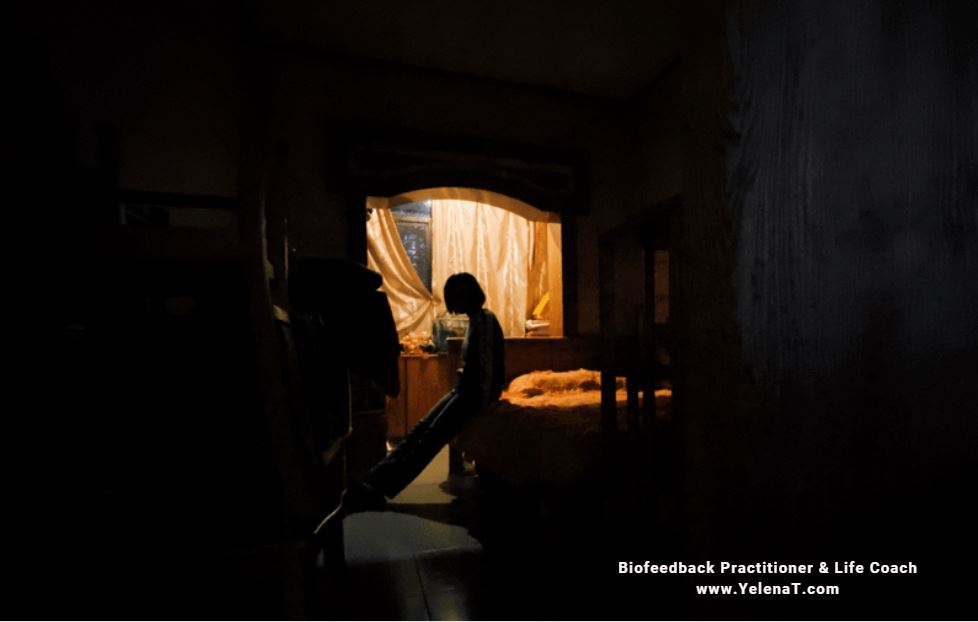Think of your last few nights of sleep. You fell asleep effortlessly, hardly even remembering lying in bed before falling asleep. But then the problem, that happens to most people with sleep disorders, arises: You wake up in the middle of the night and can’t fall back asleep. Does this sound familiar?
This is the most common question I get from clients who are struggling with sleep: “Why do I wake up and what can I do to fall back asleep?”
Many people have a hard time going back to sleep after waking up during the night. They toss and turn, think about all sorts of things, worry about what they need to get done the next day. More often than not, by morning they feel exhausted and frustrated because they didn’t get as much rest as they wanted.
So, what can be done about this? First, let’s talk about the most common reasons we wake up during the night and then what we can do about them.
Stress
A big culprit of why some people wake up during the night is stress. The human mind and body have a remarkable ability to cope with short-term stressful situations, but when the same stressors continue on for weeks or months at a time, they can lead to chronic fatigue and sleep deprivation. If stress is what wakes you up at night , you’ll need to find a way to relieve the stress.
It could be as simple as taking a walk around your neighborhood, relaxing in a hot bath or doing some yoga stretches before bedtime. Another way to help yourself to fall asleep after waking up is to relax. Try a technique such as deep breathing, or progressive muscle relaxation. Relax the muscles in your face, neck, shoulders and then move down the body and relieve any tightness you may feel in your back. You may want to focus on releasing any tension around your heart area where
Sleep Environment
When it comes to healthy sleep, there are a number of environmental factors that can disrupt your body’s natural rhythm. For instance, if the room is too warm or loud in spite of your best efforts, you may be suffering from poor sleep quality and waking up during REM. Keep your bedroom cool at night for the best quality sleep. The ideal temperature is around 60-67 degrees and if you can’t lower the room temperature, make sure to use a fan or air conditioner in the summer.
The bedroom environment is an essential factor when determining why someone is waking up throughout the night. Your bedroom should be very dark. It’s an ideal place for your body to release melatonin, a hormone that helps prepare us for sleep and regulates our circadian rhythms. Eliminate any lights in the room at night, including alarm clocks and glowing digital numbers on televisions or stereos.
Alcohol
Drinking alcohol before bed might make you feel sleepy, but in reality it’s robbing you of sleep. It can alter your circadian rhythm and lead to a disruption in your natural sleep pattern, deep sleep and REM sleep, which are the two most restorative sleep phases. This can result in poor sleep quality, frequent awakenings at night and overall increased daytime fatigue.
Sleep Medications
Sleep medications, including over-the-counter sleep aids and antihistamines for allergies, contain compounds that help you fall asleep but can interfere with your circadian rhythm. They may also make you feel more drowsy the next day and can cause serious side effects such as rebound insomnia, depression and even heart problems. Healthy sleep habits are crucial for falling asleep naturally, sleeping through the night and an overall good night’s rest.
The first step to establishing good sleep habits is to establish a regular bedtime and waking time. To help you achieve this goal, try avoiding caffeine or alcohol at least six hours before bedtime, going to bed only when you’re sleepy and turning off all electronics an hour or two before bed so your brain has time to wind down for the night.
Pain in Your Legs or Feet
If you often wake up in the middle of the night with pain shooting through your legs or feet, you may be suffering from restless leg syndrome. This is a condition characterized by an uncomfortable and irresistible urge to move your legs, coupled with extreme discomfort if you try to resist it. If you think you might suffer from Restless leg syndrome – consult your doctor.
Hormones
As we mature, women often experience disruptions to their sleep cycles during periods and menopause. Hot flashes and night sweats are a common symptom among women in the later stages of life. All these symptoms are directly related to hormonal changes. Although a woman’s hormones fluctuate naturally throughout her lifetime, it is important for women in their mid-forties and older to keep track of nighttime waking due to hot flashes and night sweats. What you can do to deter this problem is use cooling and heating pads to help comfort you. Also you can try balancing sessions with Biofeedback frequencies to balance your hormones in the body. Click below to learn more about Biofeedback:
https://yelenat.com/quantum-biofeedback/
Going to the Bathroom Frequently
If you wake up to go to the bathroom 2 or more times at night, you might have an overactive bladder . This is often caused by dehydration, or a recent change in your consumption of tea, coffee, cola’s etc. Try cutting these drinks out of your diet and drink plenty of water instead. In addition, regular exercise and an increase in your intake of minerals is also highly beneficial.
If you wake up to urinate 3 or more times in a single night consistently, and you have an adequate water intake, please consult your doctor as this might be a symptom of an underlying condition.
Headaches/ Migraines
Migraine headaches can not only be painful, but they can also affect your sleep as well. In fact, migraines may make falling asleep difficult while keeping you awake during the night. The good news is that you can get rid of the problem without taking medication. There are a few natural remedies available that can help prevent these headaches from striking in the first place.
If you are having sleep problems due to a headache or migraine you should moisturize your face, neck and chest with water before going to bed. This will help prevent dry skin which is often the cause of these headaches to begin with. If you wake at night from a headache you will need to drink more water so be sure that you have a glass of water on hand next.
If you are suffering from Migraines and/or headaches, you can schedule your Complimentary Biofeedback session and learn how it can help you: https://bit.ly/biofeedbackcall
Thank you for reading this article. I hope it was helpful. Please share if you think it’s worth sharing with your friends on Facebook or anywhere else!
Be Healthy! Be Safe! Be Well!








